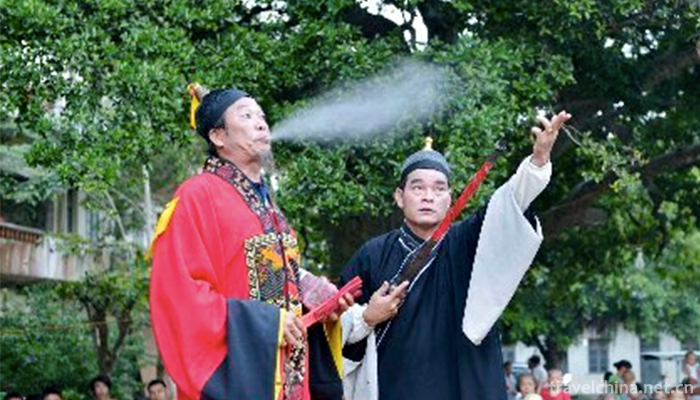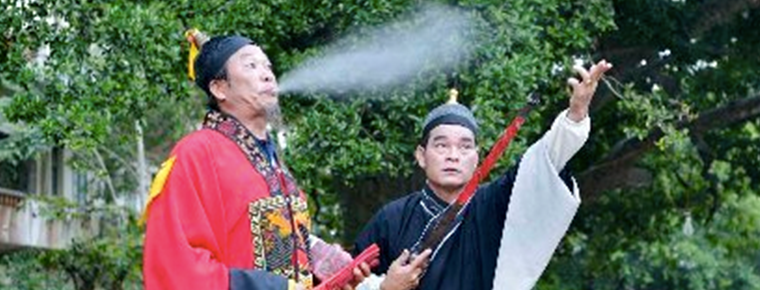Hainan Zhai Opera
Hainan Zhai Opera
Hainan Zhai Opera is a traditional sacrificial ritual drama in Hainan Province. It is similar to the Nuo Opera in northern China. It is known as "Nuo Opera in the north and Zhai Opera in the south". It originates from the folk sacrificial ceremony. Early sacrificial ceremonies were simple dances and chanting incantations, which were called "making a fast" in Hainan folk. With the introduction of foreign operas, sacrificial rituals absorbed the nutrition of the opera "singing and dancing stories" and developed into Zhai opera. Zhai Opera is the primary form of Hainan Opera. Qiongju Opera, the largest local opera in Hainan, was born out of Zhai Opera. Zhai Opera was produced in Ming Dynasty at the latest and has a history of more than 400 years.
On May 23, 2011, Hainan Zhai Opera declared by Haikou City of Hainan Province was listed in the third batch of national intangible cultural heritage list with the approval of the State Council.
historical origin
Hainan people also say "watch Zhai" when they watch Qiongju Opera. The so-called "Zhai" is Zhai Opera in Hainan.
Hainan Zhai Opera is a sacrificial ritual opera, similar to the Nuo Opera in the north of China, known as "Nuo Opera in the north and Zhai Opera in the south", which originates from the folk sacrificial ceremony.
Early sacrificial ceremonies were simple dances and chanting incantations, which were called "making a fast" in Hainan folk. With the introduction of foreign operas, sacrificial rituals absorbed the nutrition of the opera "singing and dancing stories" and developed into Zhai opera.
Zhai Opera is the primary form of Hainan Opera. Qiongju Opera, the largest local opera in Hainan, was born out of Zhai Opera. Zhai Opera was produced in Ming Dynasty at the latest and has a history of more than 400 years.
Inheritance significance
Hainan Zhai Opera has classes, artists, plays, music and performance programs. It has its own system and unique style. Zhai Opera retains the legacy of Chinese opera since Song and Yuan Dynasties, which is of great value to the study of the history of Chinese opera.
Zhai Opera is the product of folk activities, which is highly ornamental, or the spiritual link connecting Qiongzhou overseas Chinese. It integrates Hainan folk stories, ballads, folk operas, music, acrobatics, crafts and other artistic elements, and becomes the carrier of preserving Hainan traditional culture and art.
Inheritance and protection
Due to the impact of fashion culture, Zhai Opera is on the verge of losing its heritage and needs urgent protection. June 2011 was selected as the third batch of national intangible cultural heritage list.


-
1.Sweet potato porridge
Main ingredients for food ingredients: 250 grams of fresh sweet potato, 150 grams of Japonica rice, a number of red dates, and a proper amount of sesame seeds
Time 2018-11-02 -
2.Banyan Tree Shanghai On The Bund
Shanghai, one of the largest cities in the world, has a vibrant urban atmosphere, impressive urban skyline and rich and colorful culture. Located in the center of the city and resting on the Bank of H
Time 2018-12-16 -
3.Wanfeng Forest Scenic Area
Wanfeng Forest Scenic Area, located in the southeast of Xingyi City, Guizhou Province, is the largest and most typical karst peak forest in China, with its magnificent momentum, peculiar shape and bea
Time 2018-12-17 -
4.Jiulian mountain
Jiulianshan Scenic Spot is located in Songshuping Village, Shangbali Town, Huixian City, Xinxiang City, Henan Province. It belongs to the south foot of Taihang Mountain
Time 2018-12-22 -
5.Beijing Ocean Hall
Beijing Ocean Hall, located on the North Bank of Changhe River in Beijing Zoo, is adjacent to Beijing Exhibition Hall, Astronomical Museum and Capital Stadium in the south. It covers an area of 120,00
Time 2018-12-26 -
6.White Horse Temple Baima Temple
Baima Temple is located in Baima Temple Town, Luolong District, 12 kilometers east of the old city of Luoyang City, Henan Province. Founded in the eleventh year of Yongping in the Eastern Han Dynasty
Time 2019-01-02 -
7.The First Bay Scenic Area of the Yangtze River
The first bay of the Yangtze River (the first bend of the Yangtze River and the first bay of the Wanli Yangtze River): located between Shigu Town of Lijiang City in the northwest of Yunnan Province an
Time 2019-03-17 -
8.Gao Jia Opera
Gaojia Opera, a local traditional drama in Quanzhou City, Fujian Province, is one of the national intangible cultural heritage.
Time 2019-04-30 -
9.Legend of Qu Yuan
The legend of Quyuan is one of the local folklores in Zigui County, Hubei Province. The people of Zigui created and inherited folk literature with lyric and expressive expression by linking Quyuan wit
Time 2019-06-11 -
10.Chengdu Normal University
Chengdu Teachers College is an undergraduate teacher's college in Sichuan Province, which is a pilot University for the overall transformation of Sichuan's comprehensive reform. The school's predecess
Time 2019-08-31 -
11.Han Xin
Han Xin (about 231 - the first 196). The Warring States period Han Xiang Wang Ji Kun Shu sun, in order to avoid the military strategist with the same name, Huaiyin Hou Hanxin Mixed up, historical book
Time 2019-09-07 -
12.Four famous Chinese embroidery
Suzhou embroidery is famous for its fine stitches, elegant colors and fine embroidery. It has the characteristics of flat, light, even, harmonious, fine and dense. The theme is mainly about small animals. Such as "cat play", "wind through flowers",
Time 2020-12-12